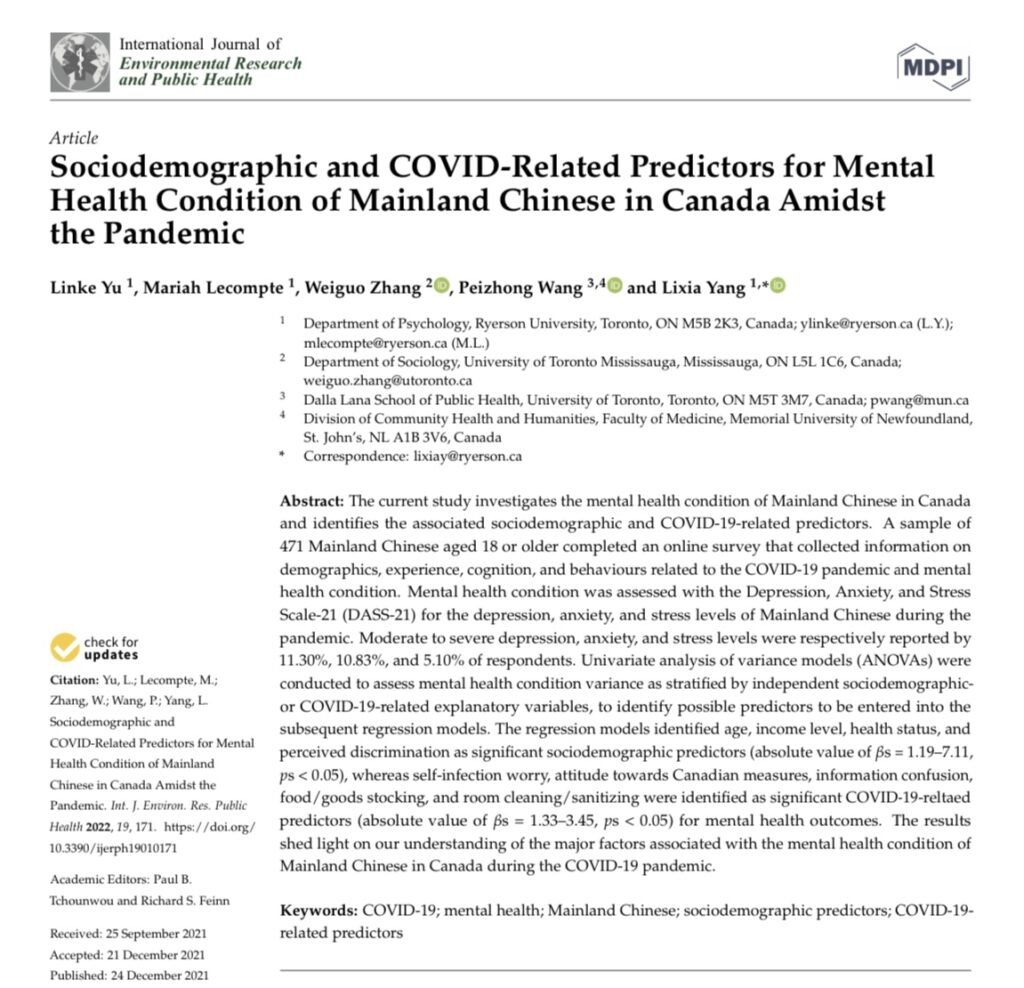Addressing Mental Health Stigmas and Barriers among Chinese Immigrants in Canada: Recommendations from Dr. Lixia Yang
Dr. Lixia Yang (杨丽霞), a professor of Psychology at Toronto Metropolitan University and co-director of the Centre for New Immigrant Well-being (CNIW), was interviewed by OMNI TV about a study she led that was recently published in the International Journal of Environmental Research and Public Health (screenshot below).
https://www.torontomu.ca/psychology/about-us/our-people/faculty/lixia-yang/

Manuscript link: https://www.mdpi.com/1660-4601/19/1/171


During the interview, Dr. Yang shared her team's recent research findings on the mental health of Chinese immigrants in Canada during the pandemic. Through a series of publications, Dr. Yang and her team identified several critical predictors of mental health risks among Chinese immigrants, including financial condition, health status, and perceived or experienced discrimination. Of particular concern, the team found that anti-Chinese discrimination, whether perceived or experienced, was a consistent and robust predictor of poor psychological wellbeing among Chinese immigrants in Canada.
Dr. Yang also highlighted the mental health stigmas and barriers faced by many members of the Chinese immigrant community in seeking professional support. She emphasized the need for mental health services tailored to their specific needs, including cultural and social service accessibility and language support. Dr. Yang stressed the importance of preventative community support, such as mobilizing community organizations to promote mental health awareness, provide resources, and educate the public and populations in need of support. In particular, attention needs to be directed towards Chinese older adults who may face additional challenges in cultural adaptation and language barriers.
To address these issues, Dr. Yang recently completed a survey study that examined the psychological wellbeing, resilience, and coping strategies of Chinese older adults in the post-pandemic era. Additionally, she and her students are planning to launch a training program to promote active aging in Chinese seniors, funded through a SSHRC Partnership Engagement Grant, in collaboration with Chinese communities such as Aging in Cloud and CNIW (Centre for New Immigrants Well-being).
近日,多伦多城市大学心理学教授杨丽霞博士接受OMNI电视台都市脉搏节目组的采访,报告过去几年课题组对加拿大华人社区心理健康的研究成果。这些研究现在陆续在科学期刊上发表,结果发现了一些影响加拿大华人移民心理健康的关键因素, 比如经济水平,健康状况,和反华歧视。其中特别令人关注的是歧视,不论是感知到的还是亲身经历到的,反华歧视对加拿大华人的心理健康都有着举足轻重的影响。
杨丽霞教授指出,由于病耻感和语言文化和服务方面的障碍,华裔移民对寻求专业帮助在一定程度上存在顾虑。她强调了预防性社区心理支持和干预的重要性,呼吁各大华人社区团结一致,普及心理健康的知识,增进大众心理健康意识,提供及时有效的支持,最大限度地维护加拿大华人社区的心理健康。
由于在文化语言方面的额外挑战,华裔长者的心理健康值得特别关注。杨教授刚刚玩成了一项关于华裔长者后疫情时代心理健康的问卷调查,目前正在策划一个准备今年夏天推出的积极老龄化训练项目。该项目由加拿大社会科学院合作基金资助,旨在通过网络给华裔长者提供有关的培训和练习,以增进积极老龄化。社区合作伙伴主要有云上俱乐部和北美华人健康。
有关这些研究项目的详细信息,请访问北美华人健康CNIW的网站:https://cniw.org或者多伦多城市大学认知老龄化实验室网站:https://psychlabs.ryerson.ca/cal/
